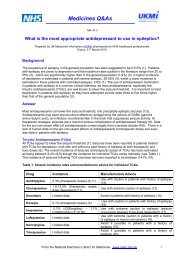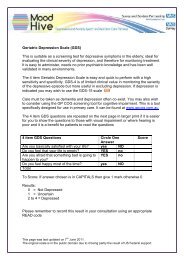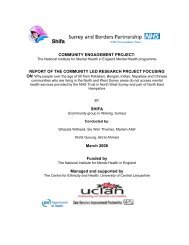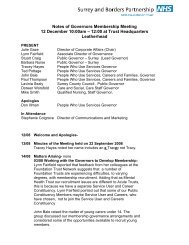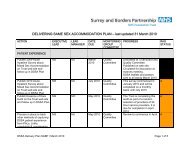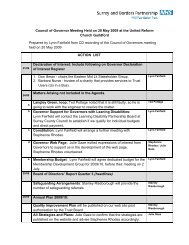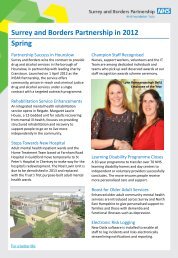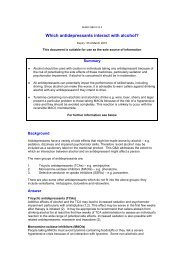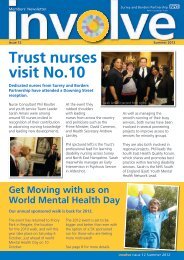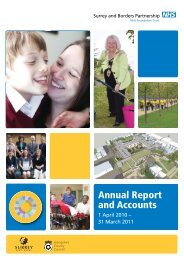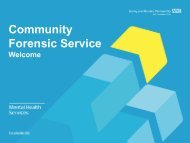Here - Surrey and Borders Partnership NHS Foundation Trust
Here - Surrey and Borders Partnership NHS Foundation Trust
Here - Surrey and Borders Partnership NHS Foundation Trust
You also want an ePaper? Increase the reach of your titles
YUMPU automatically turns print PDFs into web optimized ePapers that Google loves.
esorting too soon to complex statistical<br />
tests. This is a real issue in research in<br />
psychiatry – how to measure the elusive<br />
concepts we deal with daily. In the rest of<br />
medicine measuring blood sugar or bone<br />
density levels is much more<br />
straightforward, which is why these<br />
branches lend themselves so much more<br />
easily to research.<br />
So one early tip to the young researcher<br />
is to think very carefully before you start<br />
your study about precisely what you are<br />
evaluating <strong>and</strong> how you are measuring it.<br />
Lean heavily towards using an<br />
instrument, like a questionnaire, that is<br />
widely accepted in the field. Of course,<br />
some of the most gloriously innovative<br />
research in psychiatry involves pioneering<br />
a new measurement device, because the<br />
research community has neglected the<br />
concept you are investigating.<br />
But the problems don’t end there. Let’s say<br />
you dodged the statisticians’ scrutiny <strong>and</strong><br />
colleagues’ criticism. Then you may go on<br />
to long friendships being threatened by<br />
disputes over how to write it up. And,<br />
finally who is going to be first author?<br />
After that jockeying for position come the<br />
editors’ letters of rejection. This happens<br />
even to the most published of us. The<br />
record among people I have known is 10<br />
rejecting letters from editors for one<br />
paper <strong>and</strong> 30 rejections for a book.<br />
So given all these problems – why do<br />
research at all?<br />
I still firmly believe it’s worth it. Much of<br />
what we do as doctors arises because<br />
some researcher somewhere bravely<br />
chose to ask the question – what is the<br />
evidence for this piece of practice? There<br />
is nothing more exciting than pushing<br />
back the frontiers of knowledge <strong>and</strong><br />
discovering something new <strong>and</strong> – the<br />
icing on the ‘cake’ - is that it may alter<br />
clinical practice or improve the outcome<br />
for patients.<br />
Having a research interest keeps us<br />
stimulated <strong>and</strong> interested in our<br />
professional lives. It assists in engaging<br />
with those of similar interests all around<br />
the world <strong>and</strong> at a time when doctors<br />
frequently feel neglected or downtrodden<br />
by the <strong>NHS</strong>; it is great for the self-esteem<br />
<strong>and</strong> earns the respect of colleagues.<br />
I have been impressed at the clinical<br />
acumen <strong>and</strong> lively minds we are<br />
privileged to work alongside. I believe<br />
there would be many benefits, including<br />
raising clinical morale, for the <strong>Trust</strong> to<br />
engage more with a research ethos.<br />
Another advantage for the future is that<br />
rapidly climbing the <strong>NHS</strong> agenda now<br />
comes the issue of providing, proving <strong>and</strong><br />
improving the quality of care we provide<br />
our patients. It would be great for us to<br />
engage in research investigating what the<br />
determinants of high quality care are, in<br />
the eyes of patients as well as clinicians<br />
<strong>and</strong> scrutinize how to improve this. There<br />
may well be some surprising answers. It’s<br />
entirely possible that what doctors<br />
believe is crucial to treatment outcome is<br />
much more peripheral.<br />
Also while we are encouraged to<br />
constantly keep abreast of the latest<br />
research, its only by having done some<br />
yourself, that you are in the best position<br />
to properly evaluate an academic paper.<br />
This is because you will now be aware of<br />
many crucial issues the authors skate<br />
over, but which you know from hard<br />
experience, might be influencing the data<br />
they present.<br />
Its vital not to get pigeonholed – yes I<br />
have done brain scanning research, but I<br />
also got interested in qualitative research<br />
methods – <strong>and</strong> used them to sit <strong>and</strong><br />
observe what goes on in waiting rooms.<br />
These are spaces where our patients<br />
sometimes spend more time than they do<br />
actually seeing us!<br />
Commercial institutions like Banks had<br />
clearly put a lot of thought into<br />
considering <strong>and</strong> influencing the mental<br />
state of its customers, while they wait to<br />
see a member of staff. The <strong>NHS</strong> in<br />
contrast appeared to view the waiting<br />
room as some kind of detainment<br />
compound for undesirables. It was often<br />
at best an afterthought in planning.<br />
Yet by the time any doctor sees a patient<br />
Editorial<br />
<strong>Surrey</strong> <strong>and</strong> <strong>Borders</strong> Online Journal www.sabp.nhs.uk/journal 7



